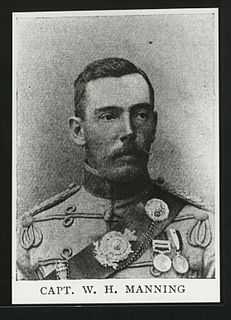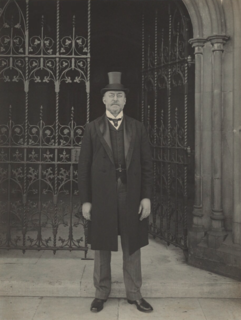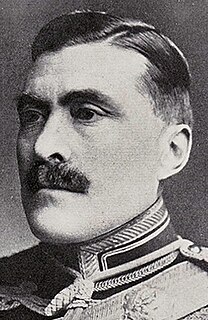
Prince Arthur of Connaught was a British military officer and a grandson of Queen Victoria. He served as Governor-General of the Union of South Africa from 20 November 1920 to 21 January 1924.

Major General Sir Newton James Moore, was an Australian politician, businessman and army officer. He served as the eighth Premier of Western Australia from 1906 to 1910 and, following service in the First World War, was a member of the House of Commons of the United Kingdom from 1918 to 1932. He was the father of Sir Rodney Moore.

Lieutenant-Colonel Sir John Gilmour, 2nd Baronet, was a Scottish Unionist politician. He notably served as Home Secretary from 1932 to 1935.
Manchester North East was one of several Parliamentary constituencies created in 1885 from the former Manchester constituency. It was abolished in 1918.

Sir Arthur Herbert Drummond Ramsay Steel-Maitland, 1st Baronet was a British Conservative politician. He was the first Chairman of the Conservative Party from 1911 to 1916 and held junior office from 1915 to 1919 in David Lloyd George's coalition government. From 1924 to 1929 he was Minister of Labour under Stanley Baldwin, with a seat in the cabinet.
Sir Alexander Sprot, 1st Baronet, was a British soldier and Scottish Unionist Party politician. He served in the Second Anglo-Afghan War, the Second Boer War and World War I. During his political career, he represented the constituencies of East Fife and North Lanarkshire.

Sir Arthur Levy Lever, 1st Baronet, known as Arthur Levy until 1896, was a British Liberal Party politician.

Lieutenant-Colonel Christian Henry Charles Guest, usually known as Henry Guest, was a Liberal Party politician in the United Kingdom.
Lieutenant-Colonel Sir Ronald Deane Ross, 2nd Baronet was an Ulster Unionist Northern Irish Member of Parliament (MP).

Brigadier-General Sir William Henry Manning, was a British Indian Army officer and colonial administrator.
Walter Egerton George Lucian Keppel, 9th Earl of Albemarle, was a British nobleman and soldier, styled Viscount Bury from 1894 to 1942.

General Sir William Charles Giffard Heneker, was a Canadian soldier who served with the British Army in West Africa, India, and then later on the Western Front during the First World War. A notable military strategist and tactician, he became one of the most experienced and highly decorated Canadians in the British Empire, and one of only a handful of Canadians to reach the rank of full general.

Tracy Russell Inglis was an Auckland medical practitioner, war surgeon and sports administrator.

Colonel Francis Alfred Lucas was a British company director and Conservative Party politician who lived in London and in Suffolk. He sat in the House of Commons from 1900 until his defeat in 1906. He died whilst a prospective candidate in the 1918 election and he was replaced by his wife, Alice Theresa Lucas.

Sir William Brampton Gurdon was a British civil servant who became a Liberal Party politician.

Lieutenant-Colonel Reginald Vincent Kempenfelt Applin, DSO, OBE was a British military officer who took a prominent part in the development of machine gun tactics in the British Army. He later entered politics, initially in two minor right wing parties before becoming a Conservative Party member of parliament.
Colonel Sir Herbert Stuart Sankey was a British barrister and politician. The son of Lieutenant-Colonel H. T. Sankey, he was educated at Marlborough School and Christ Church, Oxford before being called to the bar at the Inner Temple in 1878. He married Josephine Annesley in 1884, and they had two daughters.
The Elgin Burghs by-election was a Parliamentary by-election. It returned one Member of Parliament to the House of Commons of the United Kingdom, elected by the first past the post voting system.
Lionel Peter Collins CB, CSI, DSO, OBE was an English cricketer and British Indian Army officer. Collins played minor counties cricket for Berkshire and after attending Keble College, Oxford first-class cricket for Oxford University Cricket Club. He joined the British Army after university and in 1901 was seconded to the Indian Staff Corps, serving with the Gurkha Brigade of the British Indian Army. He was in England and North America in 1907 playing for the Marylebone Cricket Club and later appeared for the Army and Navy and Free Foresters cricket teams. Collins served with the Gurkhas on the Western Front of the First World War and received the Distinguished Service Order in 1915 for actions during the Battle of Neuve Chapelle. He later returned to British India and was mentioned in dispatches for service in Baluchistan. Collins was with British forces during the Third Anglo-Afghan War of 1919 and was appointed an Officer of the Order of the British Empire for his actions. From 1932 to 1936 he was a brigadier and commandant of the Indian Military College at Dehra Dun.